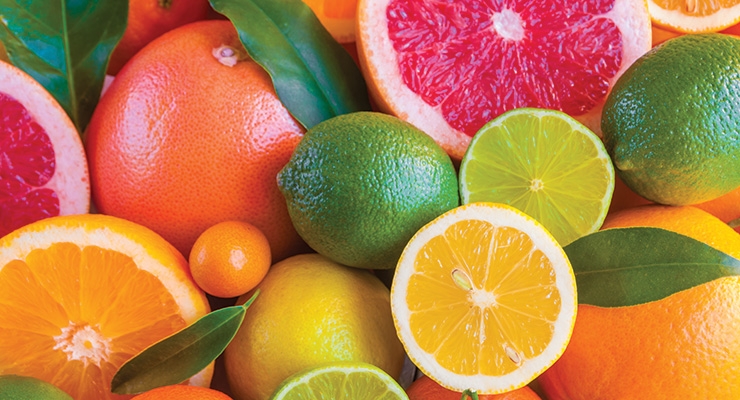Features
Citrus Bioflavonoids: Benefits, Uses & Synergy with Vitamin C
The health benefits of flavonoids have been evaluated and validated in numerous scientific studies.
By: Rob Brewster

Bioflavonoids naturally extracted from citrus fruits constitute an important group of antioxidants. The major bioflavonoids found in citrus fruits are diosmin, diosmetin, hesperidin, hesperetin, naringin, naringenin, narirutin, neohesperidin, nobiletin, tangeretin, eriodictyol, and eriocitrin. In the 1950s, the nutritional benefits of bioflavonoids were so highly recognized that this group of compounds was referred to collectively as Vitamin P. While not strictly vitamins, bioflavonoids do possess “vitamin-like” properties.
The antioxidant properties of flavonoids have been recognized for more than 40 years. Increasing intake of bioflavonoids helps prevent free radicals from causing harm in the body. Citrus bioflavonoids support balanced immune cell activity for better immune response, and support for respiratory health. They also have a synergistic function with vitamin C for enhanced immune support, and have been shown to increase absorption of vitamin C. The antioxidant and anti-inflammatory benefits of citrus bioflavonoids have been shown to support metabolic, circulatory, cognitive, and joint health.
Quality and efficacy are better validated in citrus bioflavonoids that are tested for total bioflavonoid content by HPLC as well as ORACFN value, measuring specific antioxidant activity against the most influential free radicals naturally found in the human body.
Citrus Bioflavonoid Science
Citrus bioflavonoids have been evaluated and validated in numerous scientific studies. One recent study published in Critical Reviews in Food Science and Nutrition demonstrated favorable outcomes in the anti-inflammatory, antioxidant, lipid-lowering, and insulin-sensitizing properties of the bioflavonoid hesperidin. [Assini JM, Mulvihill EE, Huff MW. “Citrus flavonoids and lipid metabolism” Curr Opin Lipidol. 2013 Feb;24(1):34-40.]
A study published in Mediators of Inflammation suggested the bioflavonoid hesperidin may have therapeutic effect on allergic asthma. It demonstrated profound inhibitory effects on airway inflammation in a mouse model of asthma. [Kim SH, Kim BK, Lee YC. “Antiasthmatic effects of hesperidin, a potential Th2 cytokine antagonist, in a mouse model of allergic asthma.” Mediators Inflamm. 2011;2011:485402. doi: 10.1155/2011/485402. Epub 2011 May 4.]
Another study published in Advances in Nutrition examined the biologic activities of citrus bioflavonoids, particularly on lipid metabolism in obesity, oxidative stress, and inflammation in context of metabolic syndrome. In particular, it showed the citrus bioflavonoid naringin displayed strong anti-inflammatory and antioxidant activities. [Chanet A, et. al. “Citrus flavanones: what is their role in cardiovascular protection?” J Agric Food Chem. 2012 Sep 12;60(36):8809-22]
Versatility in Applications
Citrus bioflavonoids have been shown to act synergistically with vitamin C in neutralizing free radicals. They are ideal for applications targeting support for the immune system, respiratory health, cognitive health, vascular integrity, metabolism, cholesterol, joint health, and systemic antioxidant support. Citrus bioflavonoids are versatile, making them excellent ingredients for food, beverage, and dietary supplement applications. They may be used in a variety of beverages, as they are suspendable in liquids. Citrus bioflavonoids also act as natural preservatives, another benefit for food and beverage products; they also provide bitter and sour taste notes for some specialty beverages, including beer.
Innovation & Standardization
Many bioflavonoids are sourced solely from oranges, but there are many other options. Drawing from a larger selection of citrus provides more opportunity for customization. Bioflavonoids sourced from orange, lemon, lime, tangerine, and grapefruit provide the broadest bioflavonoid profiles. Each one provides its own unique profile, creating more opportunities for customized formulations. The ability to extract very specific bioflavonoids in their purest form is made possible through advanced production methods and extraction technologies.
Standardization of extracts is also important. Standardized bioflavonoid ingredients ensure consistency and quality in every batch. Today, there are options for customer-specific formulations, made possible through advances in the variety of citrus complexes and purified extracts available.
Ingredients by Nature (IBN) was originally founded as Brewster Nutrition in 1932 with a focus on R&D and science-based ingredients. Brewster pioneered advances in citrus bioflavonoids and concentrated citrus extracts. With over 80 years of experience, Brewster Nutrition and its marketing arm, IBN, now produce over 300 botanical ingredients of quality and value-added solutions for condition-specific formula applications. IBN continues to put science behind its ingredients. For more information: www.ingredientsbynature.com.


